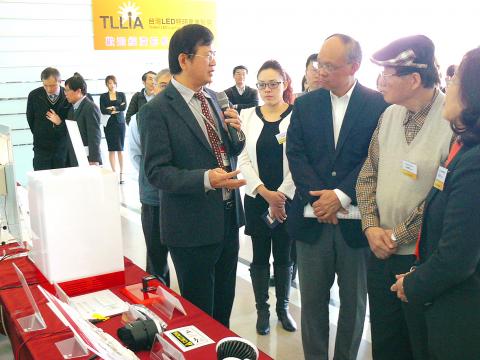Local LED lighting manufacturers yesterday urged the government to set stricter quality standards for a nationwide project to replace mercury-vapor street lamps with energy-efficient LED lamps to prevent price-cutting competition.
“Fierce price-cutting competition would sacrifice local manufacturers’ interests and would be adverse to Taiwan’s LED industry development,” a Taiwan LED Lighting Industry Association (台灣LED照明產業聯盟) official, who declined to be named, told the Taipei Times after the association held a closed-door meeting with Minister of Economic Affairs John Deng (鄧振中) in the Hsinchu Science Park.
The association, headed by David Su (蘇峰正), who is also the chairman of Taiwanese LED chipmaker Lextar Electronics Corp (隆達電子), said during the meeting that some local firms might use low-cost Chinese LED street lamps if the government does not set the bar higher for the bids, the official said.

Photo: CNA
The Cabinet approved in November a NT$5.49 billion (US$175.3 million) project to help local governments replace 692,000 mercury street lamps with LED lights by the end of next year.
Local LED lightning makers should tender bids for the project to local governments in accordance with the Cabinet’s project requirements, the Bureau of Energy said.
“LED companies need not worry about quality standards for the bids, as we already raised the bar to ensure product quality,” Bureau of Energy official Lin Kong-yuan (林公元), who was also present at the meeting, said by telephone.
Lin said the Cabinet requires local governments to award contracts based on the most advantageous bid, rather than the lowest, to ensure product quality.
In addition, the project requires bidders to use components that are 99-percent locally made to make sure it will help Taiwan’s green energy development and benefit Taiwanese LED makers, Lin said.
The association official said the nation’s LED manufacturers face international tariff barriers, especially in emerging markets. High-tariffs affect companies’ gross margins and their competitiveness in overseas markets, the official said.
Quoting Su, the official said that Taiwan’s upstream LED manufacturers enjoy a leading position in the global marketplace, while downstream firms account for less than 5 percent, because many of them are small or medium-sized firms with diverse LED lighting applications.
Su told Deng that the nation’s downstream LED manufacturers need the government’s help the most, adding that the government should assist the companies with brand promotion and the expansion of business opportunities in overseas markets.

IN THE AIR: While most companies said they were committed to North American operations, some added that production and costs would depend on the outcome of a US trade probe Leading local contract electronics makers Wistron Corp (緯創), Quanta Computer Inc (廣達), Inventec Corp (英業達) and Compal Electronics Inc (仁寶) are to maintain their North American expansion plans, despite Washington’s 20 percent tariff on Taiwanese goods. Wistron said it has long maintained a presence in the US, while distributing production across Taiwan, North America, Southeast Asia and Europe. The company is in talks with customers to align capacity with their site preferences, a company official told the Taipei Times by telephone on Friday. The company is still in talks with clients over who would bear the tariff costs, with the outcome pending further

NEGOTIATIONS: Semiconductors play an outsized role in Taiwan’s industrial and economic development and are a major driver of the Taiwan-US trade imbalance With US President Donald Trump threatening to impose tariffs on semiconductors, Taiwan is expected to face a significant challenge, as information and communications technology (ICT) products account for more than 70 percent of its exports to the US, Chung-Hua Institution for Economic Research (CIER, 中華經濟研究院) president Lien Hsien-ming (連賢明) said on Friday. Compared with other countries, semiconductors play a disproportionately large role in Taiwan’s industrial and economic development, Lien said. As the sixth-largest contributor to the US trade deficit, Taiwan recorded a US$73.9 billion trade surplus with the US last year — up from US$47.8 billion in 2023 — driven by strong

A proposed 100 percent tariff on chip imports announced by US President Donald Trump could shift more of Taiwan’s semiconductor production overseas, a Taiwan Institute of Economic Research (TIER) researcher said yesterday. Trump’s tariff policy will accelerate the global semiconductor industry’s pace to establish roots in the US, leading to higher supply chain costs and ultimately raising prices of consumer electronics and creating uncertainty for future market demand, Arisa Liu (劉佩真) at the institute’s Taiwan Industry Economics Database said in a telephone interview. Trump’s move signals his intention to "restore the glory of the US semiconductor industry," Liu noted, saying that

AI: Softbank’s stake increases in Nvidia and TSMC reflect Masayoshi Son’s effort to gain a foothold in key nodes of the AI value chain, from chip design to data infrastructure Softbank Group Corp is building up stakes in Nvidia Corp and Taiwan Semiconductor Manufacturing Co (TSMC, 台積電), the latest reflection of founder Masayoshi Son’s focus on the tools and hardware underpinning artificial intelligence (AI). The Japanese technology investor raised its stake in Nvidia to about US$3 billion by the end of March, up from US$1 billion in the prior quarter, regulatory filings showed. It bought about US$330 million worth of TSMC shares and US$170 million in Oracle Corp, they showed. Softbank’s signature Vision Fund has also monetized almost US$2 billion of public and private assets in the first half of this year,